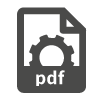PDF-Generator Module
Content

Introduction
The PDF generator takes an html template, fills variables inside that template and creates a pdf from the merged html.
Attachments like other pdfs or images may be appended.
Key Capabilities
|
Capability |
Description |
|
PDF generation |
Create PDF files from html templates alongside given variables to be filled in the template. |
Module Setup & Configuration
No configuration necessary.
Example data
<!DOCTYPE HTML PUBLIC "-//W3C//DTD XHTML 1.0 Transitional //EN" "http://www.w3.org/TR/xhtml1/DTD/xhtml1-transitional.dtd"><html><head> <!-- templates may also include css --> <style> body { font-family: 'Arial', sans-serif; color: #545454; font-weight: 100; } </style></head><body> <table class="root-table"> <tbody> <!-- Example of an image variable. The module will generate the base64 data from a given image --> <tr> <td>Image:</td> <td><img src="data:image/png;base64,${profilePic}" /></td> </tr> <!-- Example of a string variable --> <tr> <td>First name:</td> <td>${firstName}</td> </tr> </tbody> </table> <!-- Example of a list of strings variable --> <div class="additional-info__box"> <h4>Fees</h4> <#list fees as item> <p>${item}</p> </#list> </div> </body></html>Your variables might then look like:
StringVariable firstName: key: "firstName", content: "Jens"
StringListVariable fees: key: "fees", content: ["125", "166", "23"]
ImageVariable: profilePic: key: "profilePic", contentURL: "http://www.xxxxxx.com/image.png" (we will not post byte arrays here)
Example
Follow the steps provided below in order to create the desired pdf file.
Frontend Use
-
Create instances of all string, string list and image variables that may occur in your html template. These variables occur
in the form of ${attribute_name}. Provide keys as well as contents. -
Create your Attachment instances and provide file contents.
-
Create an instance of PDFTemplate. From here, reference all necessary StringVariables, StringListVariables
and ImageVariables. -
Create a PDFResult object and set references to Attachments and the PDFTemplate.
Now, the module will create the pdf file. It should be available for download after a moment.
Backend Use
-
Follow steps 1. - 3. as shown above.
-
Create a PDFResult object and set references to Attachments and the PDFTemplate.
-
You need to invoke pdf creation yourself. The package com.apiomat.nativemodule.pdfgenerator contains the
public class PDFHelper. Instantiate that class using PDFResult and Request. This example illustrates the procedure:PDFHelper helper =newPDFHelper( pdfResult, request );try{/* try to generate pdf file. On success, it will be stored in the content attribute of* pdfResult.* TemplateException: variables in html template are unset */helper.generatePdf( );}catch( IOException e ){PDFGenerator.AOM.logError( request.getApplicationName( ), e,false);e.printStackTrace( );}catch( TemplateException e ){String error ="Missing required variable: ${"+ e.getBlamedExpressionString( ) +"}";PDFGenerator.AOM.logError( request.getApplicationName( ), error,false);e.printStackTrace( );}
Limitations
If creating the pdf file from your given template information fails, the error should be that variables in the template were not filled by Variables provided.
In that case, doublecheck, if you have any typo for key names or if keys are missing.
PDF creation from attachments alone won't work either. The primary function of this module is the creation from html.
Detailled Module Workflow
Classes
|
Class name |
Attributes |
Description |
|
Variable |
key: String that refers to the name of a |
Super class for distinct Variable types |
|
StringVariable |
content: String containing a variable's value |
Sub class of Variable. Used for single |
|
StringListVariable |
content: List containing a set of Strings |
Sub class of Variable. Used for declarations |
|
ImageVariable |
content: Image that is to be placed into the |
Sub class of Variable. Used to fill image |
|
PDFTemplate |
content: String to place the html template in |
An object of this class takes an html template and |
|
PDFResult |
content: this place is filled by the resulting pdf |
An object of this class uses a template to create |
|
Attachment |
content: File (pdf or any image) that may be |
|
Sequence
After setting a reference from a PDFResult object to a PDFTemplate object (PDFResult's template attribute) or adding references to
Attachment objects, the module calls it's afterPostRef-Method that invokes the creation of the actual pdf file.
In order for this operation to succeed, the template attribute must be not null.
Errors may occur if variables in the html template are not filled out by Variable objects.